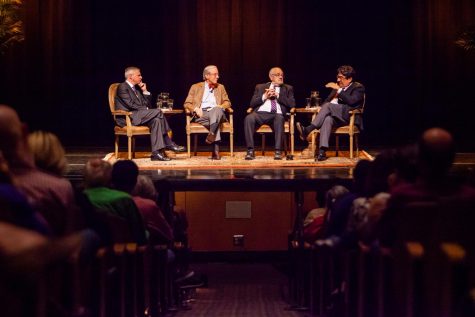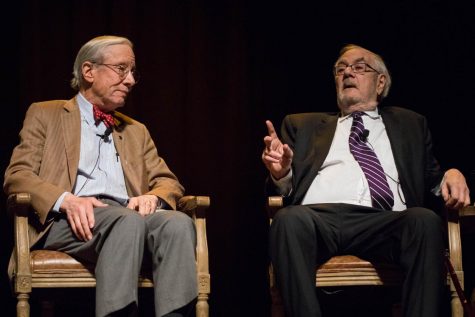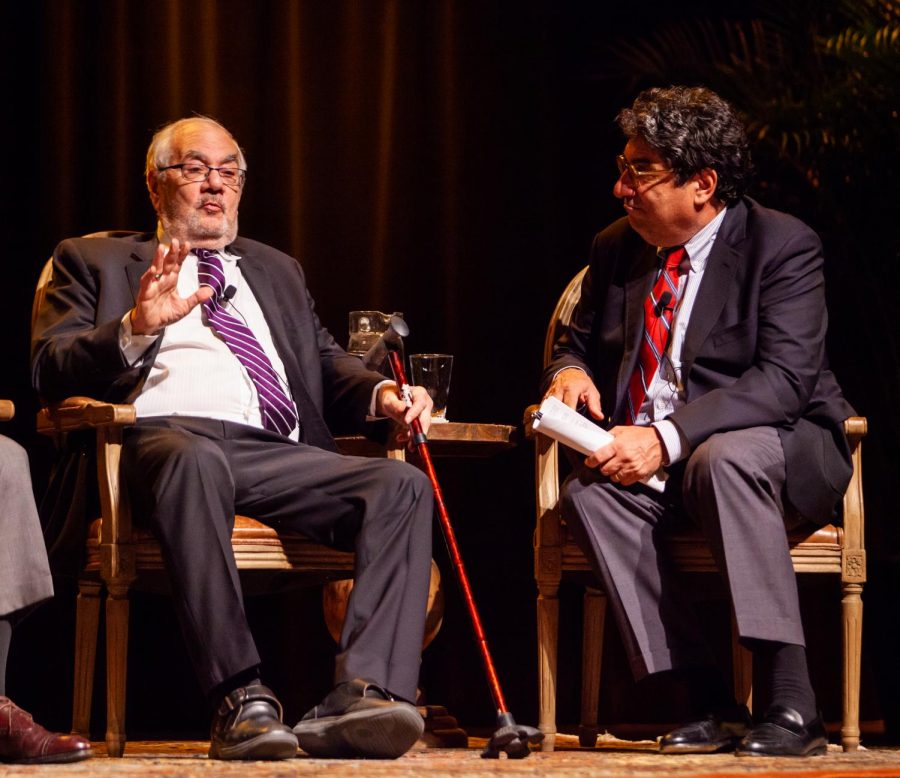Former Congressman Barney Frank represented Massachusetts’ 4th District from 1981 to 2013 and is most well-known as a leading co-sponsor of the landmark 2010 Dodd-Frank Wall Street Reform and Consumer Protection Act which was introduced in response to the 2007-09 financial crisis and overhauled U.S. financial legislation. Frank was also the first member of U.S. Congress to voluntarily come out as gay and a vocal supporter of civil rights legislation.
On April 10, Frank joined former journalist Bob Kaiser on stage at Langford Auditorium for the third installment of the Chancellor’s Lecture Series. Kaiser spent 50 years at the Washington Post and, after following Frank and other legislators through the passing of Dodd-Frank, wrote “Act of Congress: How America’s Essential Institution Works, and How It Doesn’t.” Chancellor Nicholas Zeppos and Visiting Distinguished Professor Jon Meacham joined Frank and Kaiser for a discussion of the legislative process.
Frank also sat down with the Vanderbilt Hustler to discuss his time in Congress, the country’s current political climate, and what young people can do to have their voices heard.
The Vanderbilt Hustler (VH): How has Congress changed since you first entered the House of Representatives in 1981?
Barney Frank (BF): It sadly had become a lot more partisan. First, the two parties have become more coherent – the Republicans largely on the right, Democrats on the left, but in recent years, really beginning in 1995 with Newt Gingrich, but accelerating in 2009 it has become much too partisan and it was the Republicans that did it. I was there in 2007 and 2008 when we Democrats worked closely with George W. Bush to deal with the financial crisis and gave him more support than the Republicans. Then as soon as Obama became president they declared war and we had the Tea Party and the Republicans moved very much to the right and developed a very harsh partisanship attitude. If people think I’m being unfair, I’d just ask them to compare the cooperation Democrats gave George Bush in 2007 and 2008 with the absolute obstruction the Republicans put up against Barack Obama.
VH: You mentioned 1995 as a turning point – what happened in that year?
BF: When Newt Gingrich became the Republican leader, he objected to bipartisan cooperation. He had the view that the Republicans should not talk about the Democrats as honorable people with whom they disagreed but as crooks and traitors and immoral people. That began a very harsh partisanship which increased over the years – if you look at the Clinton administration and the George W. Bush administration, there was some cooperation, but it was diminishing and the rise of the Republicans right through the Tea Party ended it. But it really did begin to deteriorate under Gingrich.

VH: What does this say about the state of U.S. politics as a whole?
BF: That it’s very discouraging. Donald Trump is a wholly negative and destructive character. The vote for him is both a sign of the economic failures of our system and the need to correct it, but also it’s discouraging that people have reacted, so many of them, the way they have. And it’s very dysfunctional. So the Republican party has really been taken over by Donald Trump.
VH: What do you mean when you say that Donald Trump is a sight of the economic failures of our system?
BF: Oh, people voted for him because of economic growth. Which used to be, maybe 30 years ago, good for everybody, but has now become not a source of wealth for the whole country, but increased inequality. And Trump appeals to the working class people, people without formal education who are angry at inequality. Unfortunately, he uses that to perpetuate the very policies that cause it, and I’m frustrated that he doesn’t see through that. The fact that economic growth now helps some people and hurts others – that is the basis of his winning, and for many of the right wing movements in Europe.
VH: Do you think we can do anything to combat this political polarization? And if so what do you think we can do?
BF: Well, I’m hoping that the voters can do something by punishing the Republican party for moving so far right. The last Congressional elections were a sad example of that and the Democrats and those Republicans too can make those public policy changes and recognize that economic growth is both a good thing and a bad thing. And unlike Clinton and Obama, who I generally supported, differed because they pushed things like international trade without demanding that fairness be a part of it. And I think from the Democratic standpoint we have to say that fairness in economic distribution is just as important as growth, rather than being an afterthought.
VH: What does fairness in economic development look like for you on a policy level?
BF: Strength for unions, a fairer tax system, more support for individuals who aren’t doing well in the private sector, for basic costs. I think there needs to be an expansion of the publicly-financed healthcare system and also an increase in funding that makes housing cheaper. I think you can do two things: you can try to increase the income of people who don’t directly benefit. You can do that through unions, you can do that through minimum wage, job education, and then you also provide more services so that they don’t have to buy as much in the private market. And then in particular, you try to expand higher education, housing, and medical care.
VH: Is there a 2020 presidential candidate that you see as focusing on those policies?
BF: Oh there are several, we have a lot of good candidates. I wish they weren’t all running actually, there’s too many, it’s dysfunctional. But at this point I’m going to wait and see which one has the best chance to win the nomination to beat Trump. The differences between the Democrats are miniscule compared to the differences between every Democrat and Trump.
VH: What gives you hope in today’s political climate?
BF: The 2018 elections. And Trump’s inept political performance. He has a very low number for the people who say they would vote to re-elect him.
VH: Do you think there needs to be any more finance reform at this point?
BF: No, I think we’re in pretty good shape. There may be some minor issues – an issue just came up about something called collateral loan obligations, which are not being subject to risk retention, that is – people are able to make loans and sell the loans to other people without having to participate if they don’t all pay off – we should fix that up. We tried to when in the original bill – but I think the basic structure is working fine.
VH: What was it like fighting for civil rights as a member of the U.S. House of Representatives from 1981 to 2013?
BF: Well it was challenging, interesting, it was – with regard to race it was, rewarding, we were having successes. With regard to LGBT civil rights, it was frustrating, but then got a lot easier.

VH: What did you learn serving in Congress? What do you want people to know about what is was like?
BF: Well, what I would like people to know is that their votes count and their opinions count more than they think. There was a self-fulfilling prophecy that they say “Oh, politicians don’t care what we think,” and then they don’t vote or don’t speak out. When in fact, politicians care very much about what people who vote think. And I think the public should be exercising their – particularly people on the left, young people, people who feel alienated – they have a power that they don’t realize and then don’t use.
VH: When you say a power that they don’t use, what do you mean?
BF: They don’t vote. And they don’t tell people how they want them to vote.
VH: What do you think is the biggest issue facing the U.S. today?
BF: The way the economy creates so much inequality. That subsumes race, as well, because race has continued to be an issue, but African Americans are particularly hurt by that, and Hispanics.
VH: What do you think we students entering the world need to know about the U.S. government? What do you hope for the future?
BF: That they have an influence that they don’t use efficiently. That the American government is not some separate entity but that it’s an instrument through which people can make changes if they will participate. Rather than being some separate, unapproachable entity, the government is a product of the voters. And I wish people would understand that more, and that more of them would vote.



